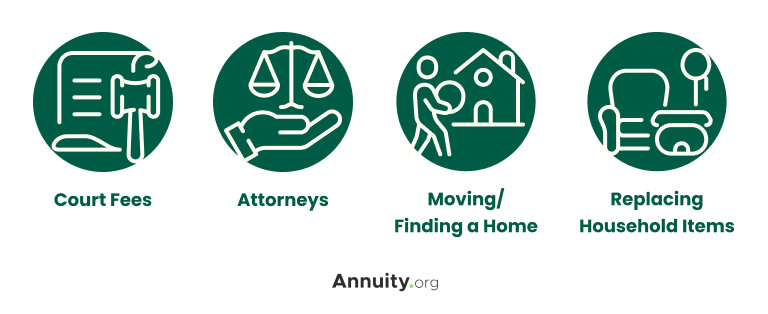Key Takeaways
- Divorce can be a life-altering event and can require significant rethinking of your child’s financial situation.
- Developing a budget and coordinating with your ex-spouse can help you develop a solid plan to handle the day-to-day care and expenses that come with raising a child.
- Long-term planning is important to consider and can include things like saving for college or estate planning.
How Much Does Divorce Cost?
Simply put, there are few affordable ways to go about getting a divorce. It is a process that is inherently expensive. The exact cost can vary heavily by situation, but the cost of a divorce can often easily exceed $10,000.
A huge part of this is due to the cost of legal expenses. According to Harvard Law, attempting to carry out a divorce without the services of an attorney is close to impossible.
The cost of a divorce and attorney may rise if it is a contentious split with many variables needing to be hashed out in court. If you end up in a custody battle, that can also add on significant expenses.
On top of court fees, your assets are also likely to take a hit. In addition to potentially splitting your financial assets in half depending on your situation, there are other factors to consider as well.
For example, you may need to find a new home, which can involve buying a house, and may need to fully furnish and stock it.
Anything you currently have that you will not receive post-divorce will need to be replaced. Those many expenses can add up quickly.

Understanding the Relationship Between Your Kids and Your Finances
When going through a divorce, understanding the relationship between your kids and your finances can be a huge part of establishing a plan to ensure your future financial wellness.
If you are a parent planning your post-divorce future, it’s important to remember that your children may be your largest expense. According to the Brookings Institution, raising a child from birth to 17 years old can accumulate to more than $300,000.
The cost of raising a child from birth to 17 averages out to nearly $20,000 a year.
This is why accounting for your children’s lifestyle can be a huge concern if you’re going through a divorce.
“Even in consultations with clients who aren’t even my clients yet, they are still worried about the children and their lifestyle,” Olivia Summerhill, a Certified Financial Planner™ professional and Certified Divorce Financial Analyst, told Annuity.org.
“If they are used to swim practice or horseback riding practice, whatever it may be, they want their kids to still have that lifestyle.”
Understanding the sheer volume of financial responsibility that comes with raising a child can help you be better prepared to account for that concern while going through the divorce process.
Whatever your financial future, the cost of caring for your children will likely be a significant part of it.
Establish Your Child’s Expenses
When determining your financial outlook with your kids post-divorce, establishing their expenses can help you get a clear view of your personal finances.
Remember that this involves a lot more than what it costs to feed and clothe them. Is child support needed and will you receive it? Which spouse’s insurance makes sense for the child to be on?
Establishing a full view of what it will financially take to raise your child can help you begin planning to do so.
Tracking Expenses
Tracking expenses is fundamental for establishing the financial cost of raising your children. You may be surprised how seemingly small expenses, like replenishing school supplies or buying a new toy, can quickly add up.
One way to get started is to spend one month tracking every expense, both one-off and recurring, related to your child. Keeping tabs on every single financial purchase for your child can help you see the bigger picture of what kind of long-term budget you will need.
There are many budgeting apps and services to help in this endeavor. A few popular and easy-to-use budgeting apps include Mint, Fudget and Goodbudget.
A divorce-specific option that may be helpful is OurFamilyWizard, a co-parenting app for those splitting custody.
Plan for Unexpected Expenses
When you are responsible for a child, many everyday costs can add up over time and eat into your finances. But there are unexpected expenses to be aware of as well.
Part of establishing your financial plan may include ensuring that you have the resources to deal with a large and unplanned expense.
Common Unexpected Expenses of Raising Children
- Unexpected doctor’s visits
- Unanticipated costs associated with school or extracurricular activities
- Replacement of expensive items
Setting up an emergency fund can be a helpful way to deal with the risk of unplanned expenses. While that is naturally easier said than done, saving makes a huge difference.
Any amount at all that can be put away to build up a fund can help. Having something is better than having nothing.
Assess Your Child’s Financial Future
Understanding your child’s day-to-day expenses and budgeting for how you will deal with them is important for establishing your post-divorce financial reality.
But the planning doesn’t stop there. On top of daily expenses, determining what your child’s financial future looks like is a consideration when going through divorce as well.
Depending on your situation and that of your ex-spouse, your child’s financial outlook may have dramatically shifted. This includes everything from planning for college to establishing a savings account for your child.
Estate Plans and Inheritance
After going through divorce, your circumstances have shifted significantly. That means your estate plan may have to as well.
Updating your will along with a financial plan for your child and what will happen to them if something happens to you can be an important post-divorce step.
Sometimes, a will that a spouse is connected to will automatically dissolve after a divorce, requiring a new will to be made. But this can vary by the situation.
Ensuring that your child is in line to receive your assets if something happens to you can be critical.
Beginning To Save
Depending on their age, if your child does not already have a savings account or hasn’t learned how to save money, post-divorce can be a good time to start teaching them the basics of finance.
It may seem silly or unimportant to create an account for a young child. But small contributions over the years of childhood can make a huge difference as they add up and help to send your child out into the world with an established nest egg.
You may also need to adjust an existing savings plan for your child post-divorce. For example, does something like their allowance need to change?
Read More: The Best Savings Accounts for Kids and Teens in 2023
Preparing for College
College can be a potentially huge expense and one that takes years to properly prepare for. According to the Educational Data Initiative, in-state tuition can cost in the range of $9,000 while out-of-state tuition can exceed $25,000.
These are expenses that you may not be able to plan for overnight. Establishing a clear college savings plan for your child can help to tackle that goal. This can include involving your ex-spouse to determine if they will be involved in this savings goal.
Determining how much you can fit into your regular budget to contribute to a college fund, along with whatever contributions your ex-spouse will make, can help you get a clearly defined picture of where your child’s college savings will be by the time they graduate from high school.
Keep in mind, there are also avenues like applying for scholarships that can help to reduce those expenses.
Read More: Students & Financial Literacy
How Does Divorce Impact Your Own Finances?
Divorce impacts your finances in many ways and, depending on your situation, can be a potentially massive adjustment. It can be stressful to have your financial situation dramatically altered, especially when you are responsible for children.
“It’s a huge topic and a huge amount of stress no matter what the financial situation of the parents is,” Summerhill said.
But understanding the ways your finances will be impacted can help you more easily grasp how you will need to adjust your life and what it will take to overcome these changes.
This includes considerations such as whether you will need to get a job or change jobs. Your tax bracket and situation may also have evolved.
Child support is also a major factor to consider. State governments’ websites typically offer calculators to help you determine how much child support you may be in line for.
But it is rarely something you can solely rely on.
“You have to take into consideration that child support most likely is not going to cover everything,” Summerhill said. “It’s quite saddening to see the numbers of how much child support actually covers. It’s so minimal, it’s shocking in every state that I work in.”
Changes To Your Schedule
Other major post-divorce factors to consider involve changes to your schedule, especially those in relation to your child.
This is the time when it will be determined whether you are sharing custody along with whether you will have more or less time with your child than before.
If you are share joint custody and your children will be moving between two homes, this can result in dramatic schedule alterations since there will be days when you are fully responsible for them and days when you are on your own.
This can affect your budget, the hours you work and more.
Coordinating with your ex-spouse can be helpful. It is another reason that divorces that are not contentious can be beneficial, even though that is not always possible.
“If they can go collaborative or with mediation and really work together as a team of parents with children through the divorce process — child support, alimony and all that can be changed because you are the ones being creative as a unit and making those decisions,” Summerhill said.
Tax Implications
There are serious tax implications to keep in mind when going through a divorce with children as well. The first is how your tax bracket has changed. Your individual situation may look considerably different than it did when you were still married.
And there are also implications directly related to your child. Both parents cannot claim the child as a dependent, so this will need to be sorted out between ex-spouses.
But that doesn’t mean that you have to completely lose out on tax advantages.
“You can be very creative if you can work with your significant other,” Summerhill said. “Each year, you can divvy it up where you get the tax benefits and you have them as the dependent post-divorce, and then next year, the other spouse gets it. You can play it however you want.”
Frequently Asked Questions About Handling Finances in Divorce
The way child support is determined varies by state, but it generally involves getting into contact with both parents and setting a payment amount and structure based on their specific situation.
A divorce can dramatically impact your child’s personal finances. You will likely have to rethink everything from saving for college to your child’s allowance depending on how significantly your finances have shifted post-divorce.
The cost of divorce can vary significantly, but a 2019 study by Martindale-Nolo found that the average cost is $12,900.
Working with a financial advisor can potentially help you to set up your child for financial success. Teaching your child the importance of things like saving and budgeting can make a big difference as well.
Expert Contributor



